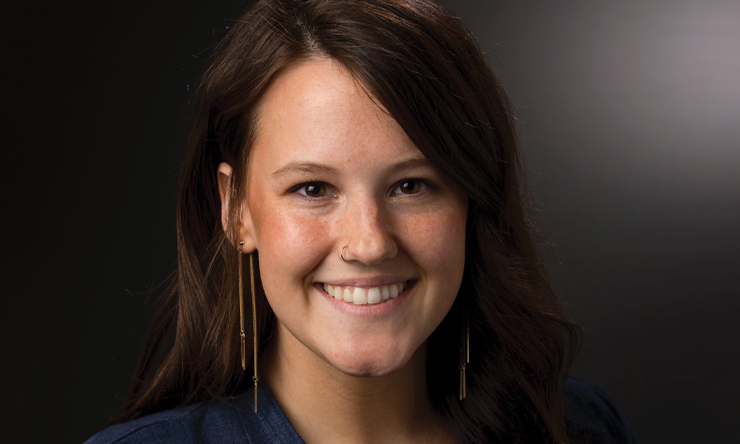To hear Glenn Brown tell it, everything happens for a reason. "I got my first job because of someone I knew at St. Ambrose," he says.
Brown sits in a booth at the Milan, Ill., McDonald's, a good place for him to meet friends, since he lives "out in the sticks." "In my last year of college, I was paired with John Dorgan, a blind day student, to help him get around to classes," he goes on. "He'd lost his sight as a youngster when a firecracker exploded in his face."
Brown and Dorgan shared many classes, and there was an affinity between them that made the partnership work. "It happened that John's brother-in-law managed the Goodyear in Davenport and needed to hire someone," Brown says. "John told him, ‘I've got the man for you.' That's how I was one of the few graduates to get a job."
Brown still marvels at the providential turn of events. Some context might help you understand his feelings of fortune: He graduated from college just a few months before the Oct. 29, 1929 stock market crash that firmly entrenched the country in a depression like it had never before experienced.
"It taught me a powerful lesson," he says, leveling you with eyes that have done 95 years' worth of seeing. "If you help someone, it will come back to you a thousand-fold the rest of your life."
On the second floor of Ambrose Hall, Rev. George McDaniel '66 pours over hundreds of documents in one of those offices whose tall, wood-clad windows reach nearly to the 13-foot ceiling. The shelves lining the walls are bristling with books, many of them dissecting some theme or issue or period in history, which is McDaniel's area of teaching and interest.
He is gathering research on stacks of three-by-five note cards to write an account of St. Ambrose's 125-year history, from 1882 to 2007, when it will be published as part of the quasquicentennial celebration. Once he's done the research-within reason, for how can mining the past ever be completed?-McDaniel will lay out the note cards. He knows from experience that that is when patterns emerge, then themes.
The cards almost speak to him-of the dreams, the challenges, the conflicts, the failures and the victories of this place and its people.
McDaniel's challenge comes in determining what is real and what is a reflection of reality, all the while knowing that "History isn't set in stone."
"My first year I took speech and there was an oratory contest. I won the dang thing."
Jack Sunderbruch, a 1932 Ambrose graduate, has an easy way of telling a story that puts you right there. He retired from medical practice a mere year ago.
"Coming in second was a young seminarian, Herman Strub," he continues. "The next year, I beat him again. I won ten dollars, an enormous sum then."
Anyone familiar with St. Ambrose knows that Father Herman Strub went on to become one of students' most beloved professors and an accomplished lecturer.
The irony is not lost on Sunderbruch. He chuckles. "I don't think he ever got over coming in second to me."
"I was about to graduate from St. Ambrose," Brown relates, "and the night before a bunch of us guys went downtown, where we saw a Packard full of boys and girls who invited me to get in. So, being in the kind of mood I was in, I hopped on the running board and rode along with them for two or three blocks. When I got off at a corner, they still wanted me to climb in. But I said, you got too many in there right now. The next day I heard those kids had driven to Carbon Cliff and about an hour later they went off a cliff and three got killed."
His pale blue eyes water. The 75-year-old memory still holds power.
It's only when you see them together that you realize how few chances Brown and Sunderbruch have to talk with another contemporary. Yet they aren't the only nonagenarian alumni. There are, remarkably, at least a half dozen St. Ambrose graduates in their nineties scattered about the country. It stands to reason that if those Ambrosians were asked, they would have similar stories: of the Depression's hardships, the war that cleaved the century in two, an educational experience that set them on their life's path. They might, like Brown and Sunderbruch, bear the deep heartache of losing spouses and, even deeper, losing children. And they might share the secret of their longevity in the face of such adversity.
"I had no business volunteering for the war with three kids," Sunderbruch says.
"I had a medical practice, too. But I spent three years in the South Pacific as a surgeon for an artillery battalion."
He claims not to be a particularly religious man, yet "Losing six soldiers in one night, it makes a believer out of you."
Months before, he and a thousand other soldiers had landed in New Guinea. Before they could disembark, a priest, sallow from malaria, came on board to say Mass to the sea-weary men.
"He asked if there was anyone there from Iowa," says Sunderbruch. "I raised my hand. He asked, had I heard of St. Ambrose? I peered at him. ‘Father Strub?' I said. He peered at me. ‘Sunderbruch, is that you?'"
He shakes his head. It's obvious that the twist of fate continues to amaze him.
As he researches, McDaniel tries not to lock into a conclusion but lets the story breathe and find life. And therein lies the paradox-and the magic: that we can derive something fresh, real and inspiring from what has already occurred.
But that's the nature of history, McDaniel says. The nature of humans.
Because history is a story, in the best sense of the word. It's as fluid as life at times, and always, evermore, enlightening.
"We were sheltered at St. Ambrose," Brown says, "but you never knew that till you got out in the world. It was better for us though. It gave you a certain amount of confidence and strengthened your faith. And if you don't have faith or family, then you're pretty bad off."
He's quiet for a moment. "Sometimes I wonder-if I hadn't gone to college, what would my life have been like?"
It's unlike him. Like Sunderbruch, he has told of lucky breaks and close calls and hard-to-believe coincidences, but it has always been with a sense of destiny.
Then he shrugs. "That's what life is really about, though-choices."
News
Share This Story



